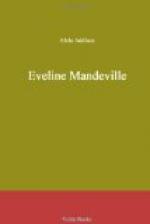The uncle thought he saw the evidence of a deep affection in her evident distress, and, as this was his object, he replied:
“Oh, I had only thought of sending him to the West Indies; but if you insist so hard, I suppose I shall have to find some one else to go.”
“There, that’s a good, dear uncle, as you always are. Oh, I am so glad Charles will not be sent away from us!”
With secret delight—for he felt sure she loved his nephew as he wished—Mr. Scofield next sought Charles, to see if an interview with him would result as satisfactorily to his wishes as with Ida. He was disappointed; Charles evidently loved Ida, but it was only with a brotherly affection. He waited a few weeks longer, and then spoke plainly to his nephew on the subject that lay nearest his heart. He told the young man how much he desired to see him and Ida united, and hoped if he did not already love her, that he would try to do so. As Charles had formed no attachment at that time, he readily consented to converse with Ida—ascertain whether her affections were engaged to him, and if so, to reciprocate them, if possible. He did so; but he found that Ida’s attachment was like his own, and then he plainly told her of his uncle’s wishes.
“I had never thought of that,” she said; “but if it is his desire and yours also, that we should be united, I think I could live happily with you.”
This was said in a matter-of-fact way, that, more clearly than anything else, showed her want of that peculiar kind of love which sanctifies marriage. Charles saw this, and replied:
“I have no doubt, Ida, but you would make one of the best of wives; but I should fear to wed you, when neither of us loved more ardently than we do.”
“Why would you fear?”
“That either or both of us might afterward see some one that we could love as those are expected to, who enter into the solemn obligations of the marriage covenant. The heart is not master of its own emotions; they come and go, regardless of our calls and commands, and we may not count upon being able to control them. How wretched it would cause either of us to be united to each other, while a third party was loved, I leave you to determine for yourself. I have been so accustomed to regard you as a sister, it seems strange to think of you in any other light; and I hope this little passage between us will not mar the freedom of our intercourse.”
“I am sure I do not intend that it shall; and I think in consenting to become a nearer companion to you than even a sister, I have given ample assurance of my esteem and regard.”
“We will then continue to be friends, and I will go at once and communicate our decision to my uncle.”
When Charles related to Mr. Scofield what had transpired between himself and Ida, he saw that his uncle was deeply disappointed and dissatisfied.
“Boy!” he said, in more of a passion than Charles had ever seen him, “Boy, you’ve made a fool of the matter and of yourself, too!”




